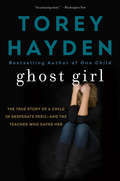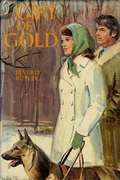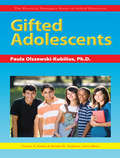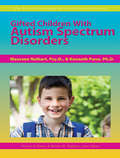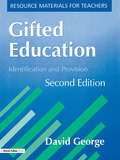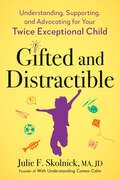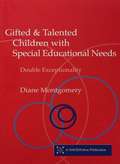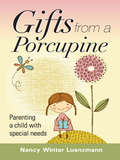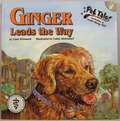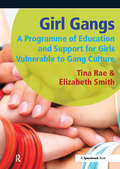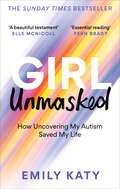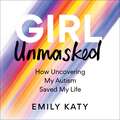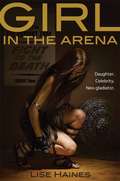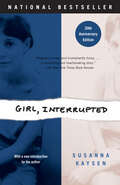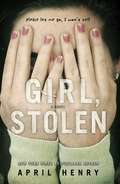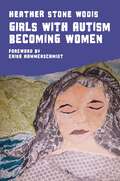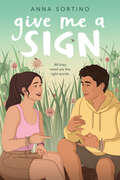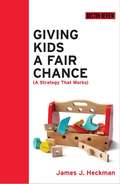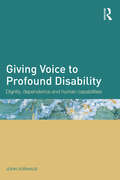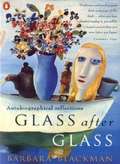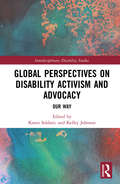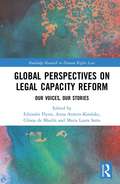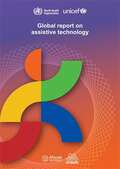- Table View
- List View
Ghost Girl: The True Story Of A Child In Desperate Peril - And A Teacher Who Saved Her
by Torey HaydenJadie never spoke. She never laughed, or cried, or uttered any sound. Despite efforts to reach her, Jadie remained locked in her own troubled world . . . until one remarkable teacher persuaded her to break her self-imposed silence.Nothing in all of Torey Hayden’s experience could have prepared her for the shock of what Jadie told her—a story too horrendous for Torey’s professional colleagues to acknowledge. Yet a little girl was living in a nightmare, and Torey responded in the only way she knew how—with courage, compassion, and dedication—demonstrating once again the tremendous power of love and the resilience of the human spirit.
Gift of Gold
by Beverly Butler<P>When Cathy Wheeler decided to become a speech therapist, she faced more than ordinary problems. Cathy was blind, and her speech department chairman said she had chosen an unrealistic profession. Even with sight, controlling young patients would be difficult, and to depend on other senses to work successfully with children would take extraordinary talent and alertness. <P>But Cathy had courage--backed up by a golden dream. An eye doctor had said that part of her sight might be restored. Not only would resistance to her chosen career stop, but Cathy knew she would find it easier to make up her mind about Greg and Steve, the two very different men in her life. <P>But suppose the verdict at the final eye examination went against her? Cathy wondered if she would have the courage then to stand on her own two feet and prove that she could handle a career in speech therapy. How would it affect her feelings about Greg and Steve? How would they feel about her?
Gifted Adolescents
by Paula Olszewski-KubiliusThe series offers 25 timesaving books on critical topics for educating gifted learners. Filled with practical information and advice, these books are ideal for classroom teachers, preservice teachers, and graduate students. In preparing this series, the authors have kept the busy classroom teacher in mind. The result is a timesaving introduction to the most important issues in gifted education.
Gifted Children With Autism Spectrum Disorders
by Maureen Neihart Kenneth PoonThis new series offers timesaving books on critical topics for educating students with autism spectrum disorders. The four books in this series are filled with practical information and advice, thus making them an ideal resource for classroom teachers, preservice teachers, and graduate students. How can teachers effectively meet the needs of gifted students with autism spectrum disorders in their classrooms? This book explores the array of issues that surround this dual exceptionality. The characteristics and needs of these students are discussed, including issues surrounding sensory integration problems, planning and organization difficulties, social competence, and educational placement decisions.
Gifted Education: Identification and Provision (Resource Materials For Teachers Ser.)
by David GeorgeThis second edition provides busy teachers, other educational professsionals and parents with user-friendly text and worksheets to enable them to identify and provide provision for The author takes a multi-dimensional view of ability and believes in educating the whole child, with a curriculum of opportunity that provides high-level learning experiences. The book has been updated in view of the developments in the education of gifted and talented children, with particular attention paid to strategies for differentiation, thinking skills and subject-specific enrichment. This book is a practical companion tot he author's popular The Challenge of the Able Child. By using many photocopiable worksheets and helpful checklists, and always bearing in mind the needs of the busy practitioner, this book will useful for anyone working in this area of education. Teachers, GATCOs, teaching assistants and parents should find the information clear and the suggested strategies rooted in good practice for teaching children of all abilities.
Gifted and Distractible: Understanding, Supporting, and Advocating for Your Twice Exceptional Child
by Julie F. SkolnickA practical, research-based guide that demystifies giftedness and learning differences in order to help &“twice exceptional&” children thrive.Does your child exhibit giftedness and behavioral issues like meltdowns, power struggles, and difficulty relating to their peers? Are they out-of-the-box thinkers requiring different teaching and learning methods? It&’s a widely held misconception that intellectual ability and social and emotional success go hand in hand. In fact, &“twice exceptional&” kids—those who are gifted and have simultaneous learning differences like ADHD, Autism, or dyslexia—are often misunderstood by parents, teachers, and themselves. This much-needed and empowering guide reveals the unique challenges these remarkable kids face, and offers strength-based, hands-on strategies for understanding, supporting, and advocating for twice exceptional kids. In a world that labels them lazy, scattered, attention-seeking, and a problem that can&’t be solved, these tools will help you reimagine the world through your child&’s unique perspective—so you can help them thrive.
Gifted and Talented Children with Special Educational Needs: Double Exceptionality (A\nace/fulton Publication Ser.)
by Diane MontgomeryGifted pupils who also have special needs often receive provision for the special need whilst the giftedness is overlooked. Children with such double exceptionality can become depressed, frustrated and misbehave, and may not fulfil their potential. Based on international research and practice, this practical text enables the reader to identify highly able pupils with special needs, such as ADHD, dyspraxia, dyslexia and Downs Syndrome, and then make provision for them within the mainstream school. The book offers three emerging themes: creating a positive, constructive and supportive learning environment; offering a cognitively challenging curriculum; and engaging the learners in partnership to understand and manage their learning support. Whilst aimed mainly at teachers and students at both primary and secondary levels, this book should also be of interest to educators, researchers and educational psychologists.
Gifts from a Porcupine: Parenting a child with Special Needs
by Nancy Winter LuenzmannGifts from a Porcupine traces the struggles and successes resulting from the family's adoption of a young child from Bogota, Columbia. Discovery of multiple disabilities seriously challenged the family --- particularly, the author as both parent and professional educator. The book, therefore, is divided into two perspectives: gifts of learning as a parent and gifts of learning as a professional. This lessons might benefit: * Couple adopting children with special needs * Parents and siblings of individuals with disabilities * Educators and educational support staff * Professionals aiding dysfunctional families * Members of families with bipolar disorder This Story gives promise to those seeking a positive outcome to a difficult journey.
Ginger Leads the Way (Pet Tales series)
by Liam O'DonnellGinger is a beautiful Golden Retriever, and her family loves her. But Ginger is more than just a pet. She is a guide dog. When her owner goes to work, eats at a restaurant, or shops for groceries, Ginger leads the way.
Girl Gangs: A Programme of Education and Support for Girls Vulnerable to Gang Culture
by Tina RaeThis vital resource offers an intervention designed to help divert young women from engaging in girl gang culture by providing them with the opportunities to explore alternative options for themselves that ensure a sense of self-worth and belonging in a non-aggressive culture where crime in not integral to their self-definition. This unique resource will give your school access to tools and evidence-based solutions that educate students about the risks of gang culture and provide them with strategies to rationalise and reject anti-social and offending behaviours. This essential resource will enable you to: identify the existence of both girl and boy gangs in school; develop whole school curriculum offering effective teaching and learning about gang issues; adopt a holistic approach to tackling gang culture including parents, community groups and local agencies; secure help for the most vulnerable students; and, prepare staff to deal with the difficulties that arise in tackling these issues.
Girl Unmasked: How Uncovering My Autism Saved My Life
by Emily Katy'Emily's moving book is a powerful testimony that shines a light on the continued failure of health services to provide any kind of meaningful improvement for autistic people. Should be essential reading for mental health professionals and anyone with autism in their lives.' - FERN BRADY, author of Strong Female Character 'This book will bring so many readers self-recognition and comfort.' - DEVON PRICE, author of Unmasking Autism'Vulnerable, affecting and deeply personal, this book will go from a message in a bottle to a rallying cry for many autistic women, girls and young people. We are not alone.' - Elle McNicoll, bestselling author'A brilliant, thorough exploration of autistic experience, delivered with humanity, compassion and vivid clarity.' - Pete Wharmby, author of Untypical'A magnificent read which manages to be informative, engaging, sad and uplifting all at the same time. Whether you're discovering that you're autistic yourself or you simply want to understand autistic people better, this is a must-read.' - Cathy Wassell, CEO Autistic Girls Network charity & author of Nurturing Your Autistic Young Person'The book I wish I'd been able to read when I was younger.' - Sarah Gibbs, author of Drama QueenTo the outside world, Emily looks like a typical girl, with a normal family, living an ordinary life. But inside, Emily does not feel typical, and the older she gets, the more she realises that she is different.As she finally discovers when she is 16, Emily is autistic. Girl Unmasked is the extraordinary story of how she got there - and how she very nearly didn't. Still only 21, Emily writes with startling candour about the years leading up to her diagnosis. How books and imagination became her refuge as she sought to escape the increasing anxiety and unbearable stresses of school life; how her OCD almost destroyed her; how a system which did not understand autism let her down; and how she came so close to the edge that she and her family thought she would never survive.In this simple but powerful memoir, we see how family and friends became her lifeline and how, post-diagnosis, Emily came to understand her authentic self and begin to turn her life around, eventually becoming a mental health nurse with a desire to help others where she herself had once been failed.Ultimately uplifting, Girl Unmasked is a remarkable insight into what it can be like to be autistic - and shows us that through understanding and embracing difference we can all find ways to thrive.
Girl Unmasked: How Uncovering My Autism Saved My Life
by Emily Katy'Emily's moving book is a powerful testimony that shines a light on the continued failure of health services to provide any kind of meaningful improvement for autistic people. Should be essential reading for mental health professionals and anyone with autism in their lives.' - FERN BRADY, author of Strong Female Character 'This book will bring so many readers self-recognition and comfort.' - DEVON PRICE, author of Unmasking Autism'Vulnerable, affecting and deeply personal, this book will go from a message in a bottle to a rallying cry for many autistic women, girls and young people. We are not alone.' - Elle McNicoll, bestselling author'A brilliant, thorough exploration of autistic experience, delivered with humanity, compassion and vivid clarity.' - Pete Wharmby, author of Untypical'A magnificent read which manages to be informative, engaging, sad and uplifting all at the same time. Whether you're discovering that you're autistic yourself or you simply want to understand autistic people better, this is a must-read.' - Cathy Wassell, CEO Autistic Girls Network charity & author of Nurturing Your Autistic Young Person'The book I wish I'd been able to read when I was younger.' - Sarah Gibbs, author of Drama QueenTo the outside world, Emily looks like a typical girl, with a normal family, living an ordinary life. But inside, Emily does not feel typical, and the older she gets, the more she realises that she is different.As she finally discovers when she is 16, Emily is autistic. Girl Unmasked is the extraordinary story of how she got there - and how she very nearly didn't. Still only 21, Emily writes with startling candour about the years leading up to her diagnosis. How books and imagination became her refuge as she sought to escape the increasing anxiety and unbearable stresses of school life; how her OCD almost destroyed her; how a system which did not understand autism let her down; and how she came so close to the edge that she and her family thought she would never survive.In this simple but powerful memoir, we see how family and friends became her lifeline and how, post-diagnosis, Emily came to understand her authentic self and begin to turn her life around, eventually becoming a mental health nurse with a desire to help others where she herself had once been failed.Ultimately uplifting, Girl Unmasked is a remarkable insight into what it can be like to be autistic - and shows us that through understanding and embracing difference we can all find ways to thrive.
Girl Unmasked: How Uncovering My Autism Saved My Life
by Emily Katy'Emily's moving book is a powerful testimony that shines a light on the continued failure of health services to provide any kind of meaningful improvement for autistic people. Should be essential reading for mental health professionals and anyone with autism in their lives.' - FERN BRADY, author of Strong Female Character 'This book will bring so many readers self-recognition and comfort.' - DEVON PRICE, author of Unmasking Autism'Vulnerable, affecting and deeply personal, this book will go from a message in a bottle to a rallying cry for many autistic women, girls and young people. We are not alone.' - Elle McNicoll, bestselling author'A brilliant, thorough exploration of autistic experience, delivered with humanity, compassion and vivid clarity.' - Pete Wharmby, author of Untypical'A magnificent read which manages to be informative, engaging, sad and uplifting all at the same time. Whether you're discovering that you're autistic yourself or you simply want to understand autistic people better, this is a must-read.' - Cathy Wassell, CEO Autistic Girls Network charity & author of Nurturing Your Autistic Young Person'The book I wish I'd been able to read when I was younger.' - Sarah Gibbs, author of Drama QueenTo the outside world, Emily looks like a typical girl, with a normal family, living an ordinary life. But inside, Emily does not feel typical, and the older she gets, the more she realises that she is different.As she finally discovers when she is 16, Emily is autistic. Girl Unmasked is the extraordinary story of how she got there - and how she very nearly didn't. Still only 21, Emily writes with startling candour about the years leading up to her diagnosis. How books and imagination became her refuge as she sought to escape the increasing anxiety and unbearable stresses of school life; how her OCD almost destroyed her; how a system which did not understand autism let her down; and how she came so close to the edge that she and her family thought she would never survive.In this simple but powerful memoir, we see how family and friends became her lifeline and how, post-diagnosis, Emily came to understand her authentic self and begin to turn her life around, eventually becoming a mental health nurse with a desire to help others where she herself had once been failed.Ultimately uplifting, Girl Unmasked is a remarkable insight into what it can be like to be autistic - and shows us that through understanding and embracing difference we can all find ways to thrive.
Girl in the Arena
by Lise HainesIn Massachusetts, eighteen-year-old Lyn, who has grown up in the public eye as the daughter of seven gladiators, wants nothing less than to follow her mother's path, but her only way of avoiding marriage to the warrior who killed her last stepfather may be to face him in the arena.
Girl, Interrupted
by Susanna KaysenA nonfictional account by the author of her life as a teenager. The story of her life in and out of a psychiatric hospital.
Girl, Stolen
by April HenrySixteen-year-old Cheyenne Wilder is sleeping in the back of a car while her mom fills her prescription at the pharmacy. Before Cheyenne realizes what's happening, their car is being stolen--with her inside! Griffin hadn't meant to kidnap Cheyenne, all he needed to do was steal a car for the others. But once Griffin's dad finds out that Cheyenne's father is the president of a powerful corporation, everything changes now there's a reason to keep her. What Griffin doesn't know is that Cheyenne is not only sick with pneumonia, she is blind. How will Cheyenne survive this nightmare, and if she does, at what price?
Girls with Autism Becoming Women
by Heather Wodis Erika HammerschmidtThis insightful book investigates the experiences of seven women with autism as they transition from childhood to adulthood, and how they make sense of that journey. Taken from the autobiographies of women including Liane Holliday-Willey and Temple Grandin, these accounts shine a light on issues unique to women with autism. Heather Stone Wodis provides a detailed and thoughtful exploration of their common experiences, and each story offers a new perspective that illuminates the diagnosis from a different angle. This is a fascinating look at how generational differences, such as access to the internet, can provide more avenues toward self-expression, political mobilization, and advocacy. It also explores the idea that, no matter the era, the unyielding support of family and a diagnosis in childhood can help girls with autism transition toward adulthood.
Give Me a Sign
by Anna SortinoJenny Han meets CODA in this big-hearted YA debut about first love and Deaf pride at a summer camp.Lilah is stuck in the middle. At least, that&’s what having a hearing loss seems like sometimes—when you don&’t feel &“deaf enough&” to identify as Deaf or hearing enough to meet the world&’s expectations. But this summer, Lilah is ready for a change.When Lilah becomes a counselor at a summer camp for the deaf and blind, her plan is to brush up on her ASL. Once there, she also finds a community. There are cute British lifeguards who break hearts but not rules, a YouTuber who&’s just a bit desperate for clout, the campers Lilah&’s responsible for (and overwhelmed by)—and then there&’s Isaac, the dreamy Deaf counselor who volunteers to help Lilah with her signing.Romance was never on the agenda, and Lilah&’s not positive Isaac likes her that way. But all signs seem to point to love. Unless she&’s reading them wrong? One thing&’s for sure: Lilah wanted change, and things here . . . they're certainly different than what she&’s used to.
Give Me a Sign, Helen Keller!
by Peter Roop Connie RoopIn this book, you will find out all about Helen Keller, before she made history.
Giving Kids a Fair Chance
by James J. HeckmanIn Giving Kids a Fair Chance, Nobel Prize-winning economist JamesHeckman argues that the accident of birth is the greatest source of inequality in America today. Children born into disadvantage are, by the time they start kindergarten, already at risk ofdropping out of school, teen pregnancy, crime, and a lifetime of low-wage work. This is bad for allthose born into disadvantage and bad for American society. Current social andeducation policies directed toward children focus on improving cognition, yet success in liferequires more than smarts. Heckman calls for a refocus of social policy toward early childhoodinterventions designed to enhance both cognitive abilities and such non-cognitive skills asconfidence and perseverance. This new focus on preschool intervention would emphasize improving theearly environments of disadvantaged children and increasing the quality of parenting whilerespecting the primacy of the family and America's cultural diversity. Heckmanshows that acting early has much greater positive economic and social impact than laterinterventions -- which range from reduced pupil-teacher ratios to adult literacy programs toexpenditures on police -- that draw the most attention in the public policy debate. At a time whenstate and local budgets for early interventions are being cut, Heckman issues an urgent call foraction and offers some practical steps for how to design and pay for newprograms. The debate that follows delves deeply into some of the most fraughtquestions of our time: the sources of inequality, the role of schools in solving social problems,and how to invest public resources most effectively. Mike Rose, Geoffrey Canada, Charles Murray,Carol Dweck, Annette Lareau, and other prominent experts participate.
Giving Voice to Profound Disability: Dignity, dependence and human capabilities
by John VorhausGiving Voice to Profound Disability is devoted to exploring the lives of people with profound and multiple learning difficulties and disabilities, and brings together the voices of those best placed to speak about the rewards and challenges of living with, supporting and teaching this group of vulnerable and dependent people – including parents, carers and teachers. Along with their personal insights the book offers philosophical reflections on the status, role and treatment of profoundly disabled people, and the subjects discussed include: Respect and human dignity Dependency Freedom and human capabilities Rights, equality and citizenship Valuing people Caring for others The experience and reflections presented in this book illustrate the progress and achievements in supporting and teaching people with profound disabilities, but they also reveal the challenges involved in enabling them to develop their full potential. It is suggested, also, that these challenges apply not only to this group, but also to people who, through sickness, accident and old age, face equivalent levels of dependency and disability. Giving Voice to Profound Disability will be of interest to all those involved in the lives of severely and profoundly disabled people, including parents, carers, teachers, nurses, therapists, academics, researchers, students and policymakers.
Glass After Glass
by Barbara Blackman'One life has many autobiographies. It depends how one sinks one's shaft of remembering. . . ' Barbara Blackman's gift for the feel and weight and place of words, the music of words, draws us into her life as daughter, lover, friend, wife, mother, grandmother. She writes of the wonderful ordinariness of 'household things, children above all, dirty, earthy and high-to-Heaven things. Her portraits of family and friends, many to become among Australia's finest artists, reveal both a delightful sense of the absurd and a great capacity to love. Blind since her early twenties, Blackman writes about the bohemian circles of Australia and London, where she and her artist husband were leading figures.
Global Perspectives on Disability Activism and Advocacy: Our Way (Interdisciplinary Disability Studies)
by Kelley Johnson Karen SoldaticThis book explores the diverse ways in which disability activism and advocacy are experienced and practised by people with disabilities and their allies. Contributors to the book explore the very different strategies and campaigns they have used to have their demands for respect, dignity and rights heard and acted upon by their communities, by national governments and the international community. The book, with its contemporary global focus, makes a significant contribution to the field of disability and social justice studies, particularly at a time of major social, political and cultural upheaval. Global Perspectives on Disability Activism and Advocacy offers a significant intervention within the field of disability at a time of major social upheaval where actors, advocates and activists are seeking to hold onto existing claims for rights, equality and disability justice.
Global Perspectives on Legal Capacity Reform: Our Voices, Our Stories (Routledge Research in Human Rights Law)
by Eilionóir Flynn Anna Arstein-Kerslake Clíona De Bhailís Maria Laura SerraThis edited collection is the result of the Voices of Individuals: Collectively Exploring Self-determination (VOICES) based at the Centre for Disability Law and Policy, National University of Ireland Galway. Focusing on the exercise of legal capacity under Article 12 of the UN Convention on the Rights of Persons with Disabilities, the stories of people with disabilities are combined with responses from scholars, activists and practitioners, addressing four key areas: criminal responsibility, contracts, consent to sex, and consent to medical treatment. Sustainable law and policy reforms are set out based on the storytellers’ experiences, promoting a recognition of legal capacity and supported decision-making. The perspectives are from across a wide range of disciplines (including law, sociology, nursing, and history) and 13 countries. The volume is a valuable resource for researchers, academics and legislators, judges or policy makers in the area of legal capacity and disability. It is envisaged that the book will be particularly useful for those engaged in legal capacity law reform processes worldwide and that this grounded work will be of great interest to legislators and policy makers who must frame new laws on supported decision making in compliance with the UNCRPD.
Global Report on Assistive Technology
by World Health Organization and the United Nations Children’s FundThis Global Report on Assistive Technology captures for the first time a global snapshot illustrating the need, access to and the preparedness of countries to support assistive technology. More than 2.5 billion people require one or more assistive products, and this is expected to grow to over 3.5 billion by 2050 as the global population ages. The Report also features many stories illustrating the profound impact that assistive products such as spectacles, hearing aids, communication devices and wheelchairs can have on people’s lives. There is also evidence of the economic and social return on investment in assistive technology. And yet, despite the benefits, many people do not have access to assistive technology, with the gaps greatest in low- and middle-income countries. This global inequity requires urgent collective attention and action.
